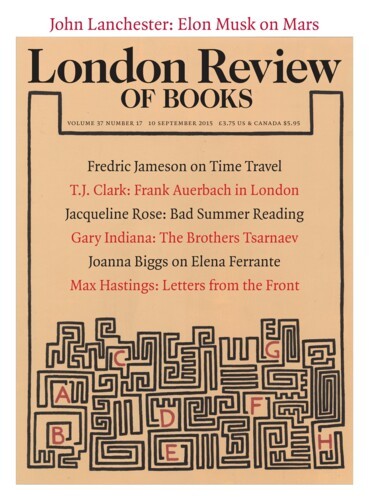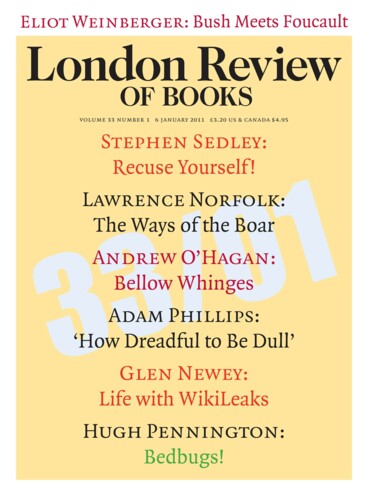Trouble over Trident has struck deep into the souls of disaffected Labour politicians, from those who say they ‘disagree with Jeremy’ to those making clear they will go to the stake for the ‘independent’ deterrent. Their belief in it turns on three considerations, spelled out three years ago by Luke Akehurst in Progress. First, jobs: the renewal of Trident is a jobs-protection scheme, worth £100 billion (Akehurst asks ‘what Barrow, or for that matter Derby or Aldermaston, are supposed to do to replace the highly skilled engineering jobs dependent on Trident renewal’). Second, ‘punching above our weight’ to ensure a ‘place at the table’, most notably as a member of the Permanent Security Council of the UN, a politically bankrupt arrangement if ever there were one. Third, insurance, a policy with a very high premium but worth every penny when heart-wrenchingly packaged: ‘I support Trident renewal because I want my children and hopefully their children to have a country in 50 years time which is still protected by a deterrent so powerful that no other power that arises in the intervening five decades, however hostile or malign, would risk bullying us with nuclear or other WMD threats.’ This is the family-man doctrine of deterrence.
Christopher Prendergast
Christopher Prendergast is a fellow of King’s College, Cambridge.
Pirouette on a Sixpence: Untranslatables
Christopher Prendergast, 10 September 2015
On the face of it a Dictionary of Untranslatables looks like a contradiction in terms, either self-imploding from the word go, or, if pursued, headed fast down a cul-de-sac in which it is doomed to end by putting itself out of the business of dictionary-making. Strictly speaking, all the definitions of the listed terms would have to be blanks, a new version of Flaubert’s dream of the...
The Oxford Student recently ran – and later retracted – a story about a Bullingdon Club initiation ceremony which allegedly included burning a £50 note in front of a tramp. Whether or not the story’s true, it pales beside Baudelaire’s narrative prose poem ‘Let’s Beat Up the Poor’.
Short Cuts: Student Loans
Christopher Prendergast, 6 January 2011
A ‘progressive’ system means, broadly speaking, that some people pay more than others for the same benefit, on the grounds that they can afford to, just as some pay more taxes, both absolutely and proportionally, to fund government services. There can be no doubt that the Coalition policy on student debt is ‘progressive’ in the sense that some will pay (back) more than...
Short Cuts: Sarah Palin’s Favourite Frenchman
Christopher Prendergast, 2 December 2010
Hands up who knows that a major source of Tea Party ideological fervour is a long-forgotten 19th-century French economist – French no less (it wasn’t so long ago that John Kerry was derided for being ‘a bit French’). Indeed, hands up who has even heard of Frédéric Bastiat. The name, canonical and talismanic in Tea Party circles, means nothing to most...
Pieces about Christopher Prendergast in the LRB
All the world’s a spy novel: What Didn’t Happen
Michael Wood, 30 July 2020
Why is luck good or bad, an incentive to gambling, while chance seems weirdly neutral? And what was it like in the old days when Fortune played a larger role in ordinary consciousness, taking up quite...
The Thing: Versions of Proust
Michael Wood, 6 January 2005
What was it Proust said about paradise? That all paradises are lost paradises? That the only true paradise is a lost paradise? That it isn’t paradise until it’s lost? That paradise is...
Unreal City
Michael Wood, 7 October 1993
Baudelaire’s city is swarming with people and full of dreams, a place of daylight ghosts. Fourmillante cité, cité pleine de rêves Où le spectre, en plein jour,...
I am a Cretan
Patrick Parrinder, 21 April 1988
The story goes that, on the day when William Empson moved into Magdalene College, Cambridge, to take up a fellowship, his suitcases (as was the custom in those days) were unpacked by one of the...
Read anywhere with the London Review of Books app, available now from the App Store for Apple devices, Google Play for Android devices and Amazon for your Kindle Fire.
Sign up to our newsletter
For highlights from the latest issue, our archive and the blog, as well as news, events and exclusive promotions.




